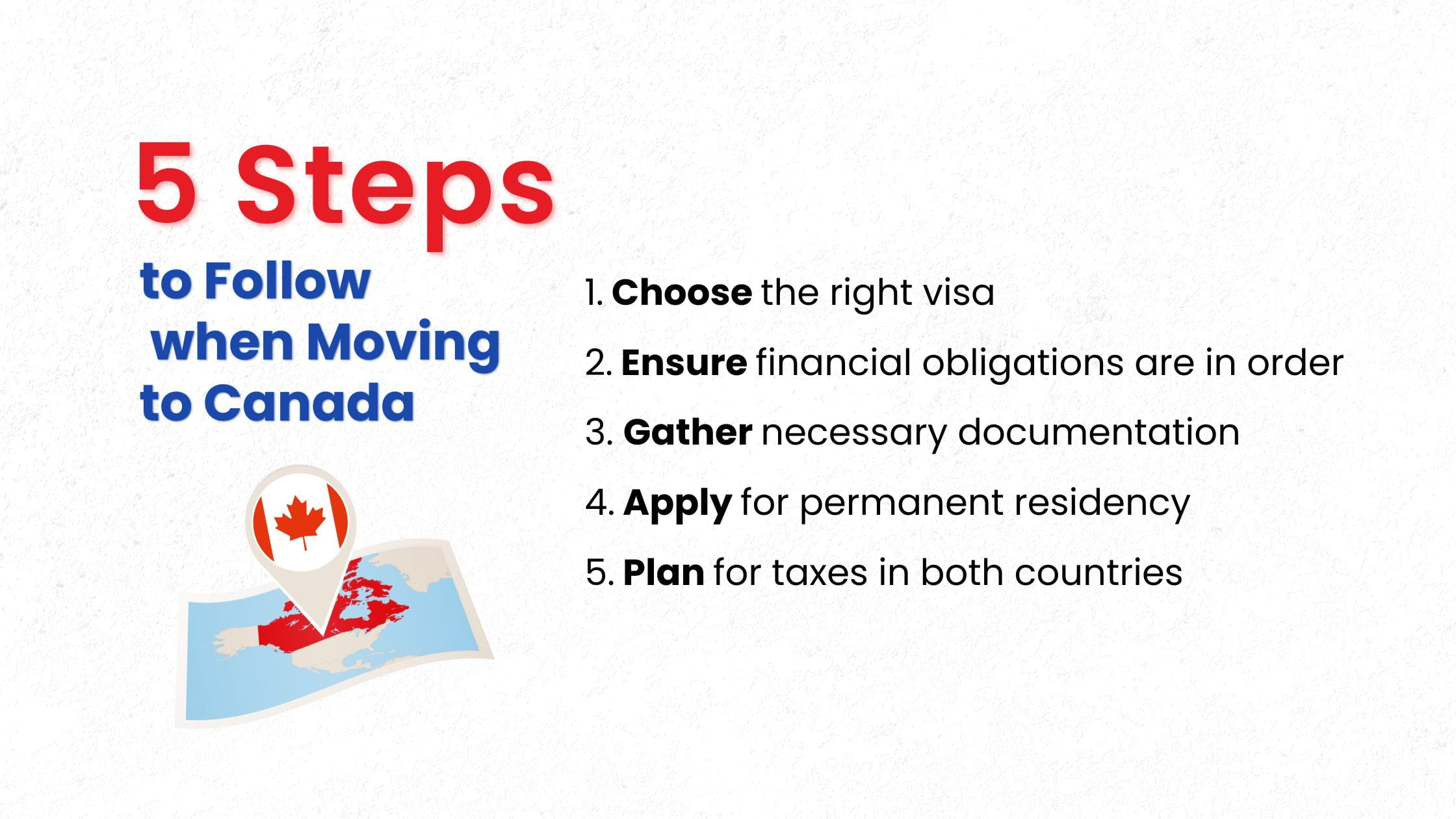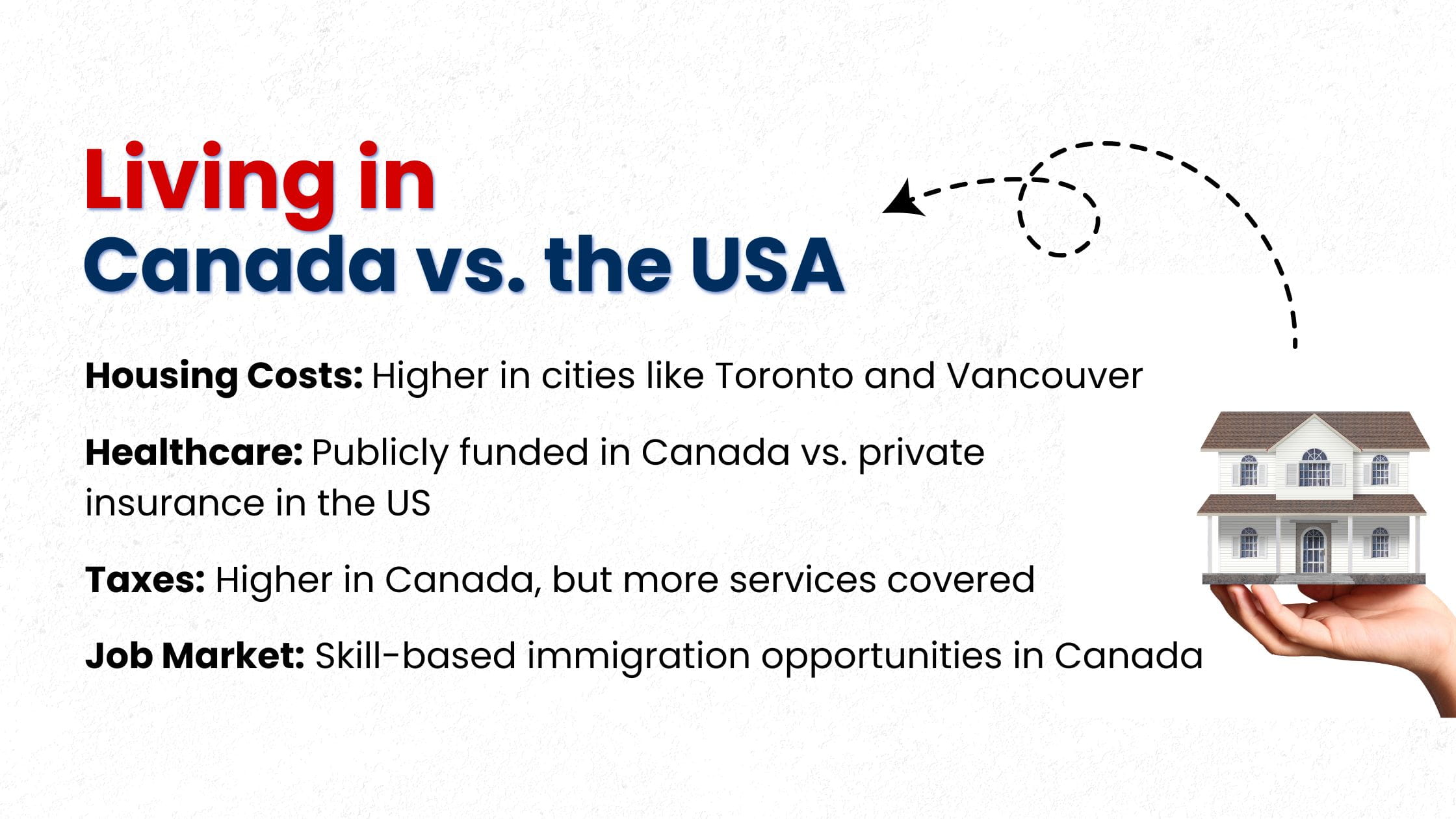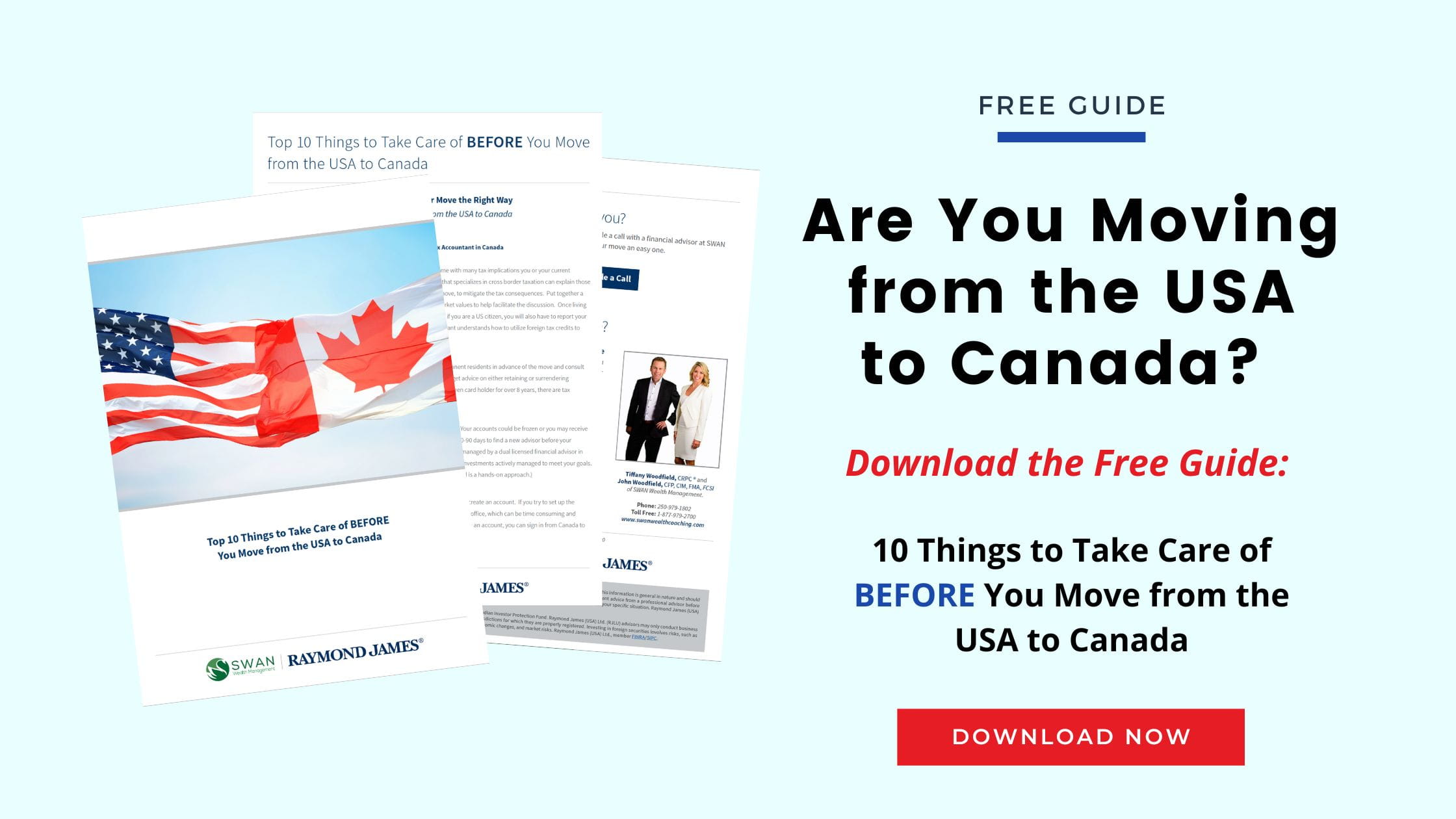How Hard Is It to Move to Canada from the US?
Authors: Tiffany Woodfield, TEP®, Associate Portfolio Manager, CRPC®, CIM® and John Woodfield, Portfolio Manager, CFP®, CIM®
Moving to Canada can feel like an overwhelming task.
For successful professionals in the U.S., it's not just about packing your bags and crossing the border. You need to understand the financial and legal aspects of such a move. In particular, if you have substantial investments in the U.S., you'll want to ensure you work with a cross-border financial advisor and accountant before moving to Canada.
Financial obligations in the U.S., like taxes, don’t disappear, so careful planning is key.
Regarding difficulty, over 400,000 people obtained Canadian permanent residence in 2023. That number alone indicates that it’s not impossibly difficult. But you'll need to research the various visas to see the best fit for you. And you’ll need to follow a step-by-step process to avoid making any mistakes.
In addition, if you want to obtain Canadian citizenship because you plan on living here long-term, you can rest assured that as long as you follow the guidelines, getting your citizenship is not complicated. Many of our clients have gotten PR cards and become citizens.
Moving to Canada isn't excessively difficult, but it will take time.
It's best to create a solid plan and follow a step-by-step process so your move is simple and stress-free. Make sure you have the right visa and know what is required to get your PR card so you can become a permanent resident.
Finally, be sure you assemble your cross-border team sooner rather than later.

Is it hard for U.S. citizens to move to Canada?
The process of moving to Canada is complex but not impossible.
U.S. citizens don’t have a special status when it comes to immigration, but there are options that make it possible to live in Canada. You’ll need to meet certain criteria, like having a job offer or specific skills that are in demand.
While Canada is known for being immigrant-friendly, the paperwork can be lengthy. Immigration programs like Express Entry or Provincial Nominee Programs (PNPs) take time, so patience is required. Plus, making sure your financial and legal affairs are in order before you move is crucial for a smooth transition.
So, while it's not "hard" to move to Canada, it is complex.

What are the requirements for moving to Canada?
Canada’s immigration requirements vary depending on the path you take.
If you plan to move for work, you need a job offer from a Canadian employer or qualify under one of Canada’s immigration programs. If you bring family, they must be included in the application and meet specific health and security standards.
Financially, you’ll need to prove you can support yourself. You may need proof of funds, especially if you're not moving for a job. Keep in mind Canada has strict tax regulations, so understanding the tax implications of dual residency is crucial.
Can you move to Canada without a job?
Moving to Canada without a job is possible, but it may be more difficult.
Some immigration programs, like the Express Entry system, allow you to qualify without a job offer. However, you’ll need to meet other criteria, like having a certain amount of money in savings and being highly skilled in a field that Canada needs.
You’ll also need to show you can support yourself while looking for work. While it’s possible, it’s much easier to immigrate with a job in hand.
Can a U.S. citizen live in Canada permanently?
A U.S. citizen can live in Canada permanently, but only if they meet immigration criteria.
The most common way Americans gain permanent residency is through Express Entry or Provincial Nominee Programs (PNPs). If you become a permanent resident, you can live and work in Canada indefinitely, but this doesn’t make you a Canadian citizen.
After a few years, you may be eligible to apply for citizenship. It’s also essential to understand how taxes work in both countries.
U.S. citizens must continue filing taxes in the U.S. even after becoming Canadian residents, which makes cross-border financial advice essential.
Make sure you find out about PFICs, FBAR reporting, and exit taxes when planning your move.
Is it cheaper to live in Canada or the U.S.?
Whether it’s cheaper to live in Canada or the U.S. depends on where you live.
Major cities in Canada, like Toronto and Vancouver, have higher housing costs than many U.S. cities. However, healthcare is publicly funded in Canada, which could lower overall living expenses, especially if you have significant medical costs.
Taxes in Canada are generally higher than in the U.S., but they cover more public services like healthcare and education. If you’re used to paying for private health insurance in the U.S., Canada’s system might feel like a relief.
Make sure you create a budget for your new life in Canada and compare your expenses in Canada to those in the U.S.

Immigration Programs in Canada
Canada offers several immigration programs, but the most popular is Express Entry.
Express Entry is a points-based system that manages applications for three major immigration programs: the Federal Skilled Worker Program, the Federal Skilled Trades Program, and the Canadian Experience Class.
Points are awarded based on age, education, work experience, and language skills.
Provincial Nominee Programs (PNPs), where provinces nominate candidates based on their skills and job market needs, are also common. These programs are competitive, and it’s important to ensure your application is strong to maximize your chances of success.
It may be wise to work with an immigration lawyer who understands the process and can help assist you in your immigration process.
Financial Planning Tips for Americans Moving to Canada
Common Questions
Is the Canadian government pro-immigration?
Yes, the Canadian government is very pro-immigration. The Canadian government website states, "Canada aims to welcome 485,000 new permanent residents in 2024, 500,000 in 2025, and plateau at 500,000 in 2026."
Programs like Express Entry and Provincial Nominee attract skilled workers and professionals, helping Canada maintain a diverse and dynamic labor market.
What is required to get Canadian permanent residence?
To obtain Canadian permanent residence, you must qualify under programs like Express Entry or Provincial Nominee Programs. Meeting criteria like skilled work experience, education, and language proficiency is essential.
Permanent resident status allows you to live, work, and study in Canada indefinitely, but you must maintain residency requirements.
Does Canada have a strong immigration program?
Yes, Canada has one of the most robust immigration programs globally. It offers various pathways for skilled workers, business investors, and family reunification. The Express Entry system, Provincial Nominee Programs, and family sponsorship programs make immigration accessible to individuals from diverse backgrounds.
What is the Federal Skilled Worker Program?
The Federal Skilled Worker Program is for skilled workers with foreign work experience. Applicants are assessed based on factors such as education, work experience, and language skills. It’s part of the Express Entry system, and high-ranking candidates can obtain permanent residence to live and work in Canada.
Can Canadian permanent resident status be revoked?
Yes, Canadian permanent resident status can be revoked. Having your status revoked can happen if you fail to meet residency requirements, commit a serious crime, or are found to have provided false information during the application process. Permanent residents must maintain a physical presence in Canada to retain their status.
What is the Canadian Experience Class?
The Canadian Experience Class is an immigration program within the Express Entry system. The program allows individuals with skilled work experience in Canada, such as temporary workers or international graduates, to apply for permanent residence. It helps them transition to living in Canada permanently.
If I have family members in Canada, can I get a visa more easily?
Having family members in Canada can make it easier to obtain permanent residence. Through the family sponsorship program, Canadian citizens or permanent residents can sponsor close relatives, such as spouses, children, or parents, for immigration. This visa does not apply to more distant relatives.
What are the main rights and obligations of Canadian citizens?
Canadian citizens can vote, run for public office, and hold a Canadian passport. They are also obligated to follow Canadian laws and pay taxes. Unlike permanent residents, citizens cannot lose their status or be deported and can live abroad without losing any rights.
Next Steps
If you’re a Canadian resident or are planning on moving to Canada or the U.S. and need assistance with moving and optimizing your investments, estate planning, wealth management, and portfolio management, please get in touch. At SWAN Wealth, we specialize in Canadian financial planning, cross-border financial planning, and cross-border wealth management.
Read More
If you’re planning a cross-border move, these articles and guides will help simplify your move and ensure you’ve covered everything.
How to Bring Inheritance Money Into Canada
Cross-Border Estate Planning Guide
A Simple Guide to U.S. Taxes in Canada
About the Authors
Tiffany Woodfield is an Associate Portfolio Manager licensed in Canada and the U.S., a Chartered Investment Manager (CIM), a Chartered Retirement Planning Counselor (CRPC), a Trust and Estate Practitioner (TEP), and the co-founder of SWAN Wealth Management, along with her husband, John Woodfield. Tiffany advises clients who live in Canada and the United States and want to simplify their cross-border financial plan, move their assets across the border, and optimize their investments to minimize their tax burden. Together, Tiffany and John Woodfield help their clients simplify their cross-border finances and create long-term revenue streams to keep their assets safe whether they live in Canada or the U.S.
John Woodfield is a Financial Management Advisor (FMA), a Chartered Investment Manager (CIM), and a Certified Financial Planner (CFP). In 2007, he was inducted as a fellow of the Canadian Securities Institute (FCSI). As a portfolio manager and CFP®, he works with clients across Canada. John Woodfield’s clients are families, individuals, and business owners who understand the importance of comprehensive wealth and investment plans driven by the lifestyle they want to lead.
Schedule a Call
Schedule a 15-minute introductory call with SWAN Wealth Management. Click here to schedule a call.
▶️ Download the Cross-Border Guide





